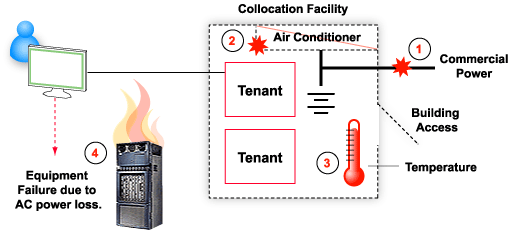Download our free Monitoring Fundamentals Tutorial.
An introduction to Monitoring Fundamentals strictly from the perspective of telecom network alarm management.
1-800-693-0351
Have a specific question? Ask our team of expert engineers and get a specific answer!
Sign up for the next DPS Factory Training!

Whether you're new to our equipment or you've used it for years, DPS factory training is the best way to get more from your monitoring.
Reserve Your Seat TodayKnowing what's really going on at collocation facilities can be difficult to the point of impossibility. Whether you're a tenant at the facility, or even if you own the building, most of the site is outside your control.

But that's exactly why you need to monitor collocation facilities closely. If you're a collocation tenant, monitoring the factors that you can't control will keep you a step ahead of potential threats to your network.
And if you're a collocation host, you have an even greater need to keep close tabs on your collocation facilities. You have a contractual obligation to provide your tenants with a specified standard of environmental conditions and site security.
Collocation facilities are not always able to provide a constant supply of power to their tenants. The collocation agreement usually specifies that the collocation host will provide AC and DC power, and a backup power supply in case of commercial power failure. However, large-scale or long-term power outages can strain even the best-prepared backup power plans.
Collocation hosts usually fully monitor facility power, including the commercial power supply, battery levels, and generator activity. It's beneficial for all parties for hosts to share this information with all the occupants of the collocation facility.
Alarm sharing can be performed automatically with the DPS Telecom Alarm Distribution Shelf (ADS). A DPS client who manages collocation facilities routinely uses the ADS to share power alarms with tenants.
Collocation hosts should also regularly test backup generators to ensure they are working properly. This task can be conveniently automated with the T/MonXM Network Alarm Management System. Let's say the generator at your collocation site performs a self-start test every Thursday at 3 a.m (which can be considered as a nuisance alarm). Using T/MonXM's derived alarms feature, you can create a custom alarm that will notify you only if the generator fails to perform the test.
Site security is an especially important consideration for both collocation hosts and tenants. Personnel from each of the companies tenanted at the facility are coming and going at all times, so it makes excellent sense to monitor entry to your portion of the facility.
To get the best security of remote entries, you need a keyless access control like the Building Access System (BAS). Access is granted only to personnel who enter the correct code on the keypad. For people who need temporary access to the site, like outside repair staff, you can assign entry codes that expire after a certain time.
Control who enters your facility, which parts of the facility they can access, the time they can enter, and how long they can stay. The BAS will maintain complete logs of all entries.
Best of all, the BAS integrates into the rest of your remote site monitoring. If there is an intrusion at your collocation facility, or someone attempts entry with an invalid code, you will be immediately notified by your Network Alarm Management System.